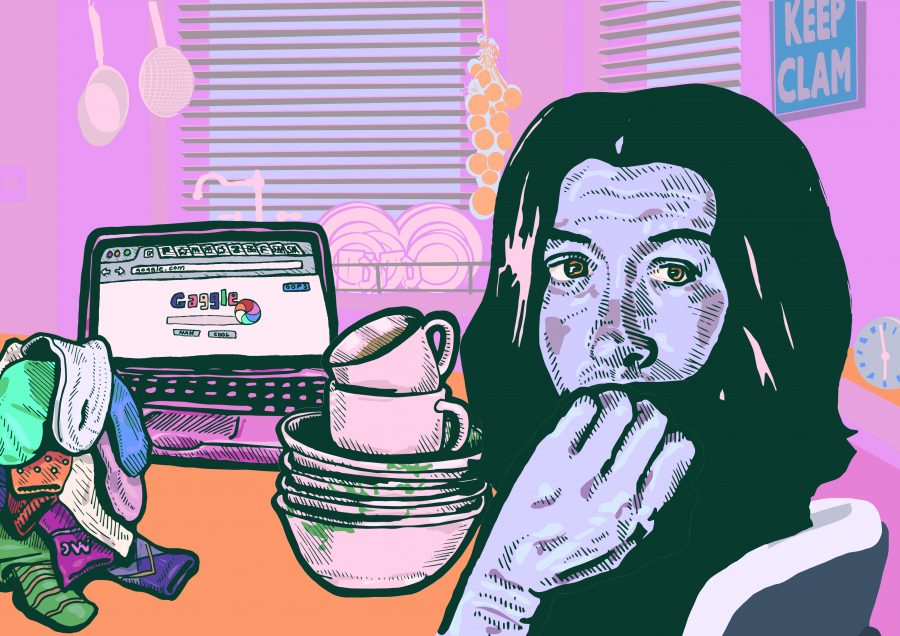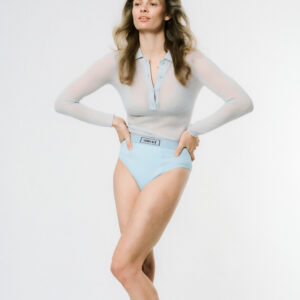When 'working from home' becomes running the house and a million other things
Feature 22.02.17
Words Emily Gosling Illustration Ben McLeavy
Women who eschew the 9-5 for a freelance lifestyle often feel an internal pressure to not just work from their home, but to take on the cooking and cleaning while they’re there. We spoke to four women and two men of varying ages, backgrounds and sexual orientations working in the creative industries to find out if and why they feel like that, where the pressure comes from, and how healthy it is to want to be everything to everyone

As the inimitable Kate Bush, and so many more imitable people have said, “we can’t have it all.” And for all the fridge magnet, serif font quotes that tell you otherwise, we shouldn’t want to “have it all,” and we needn’t want to “be” it all either.
That drive to be everything to everyone (and most of all, ourselves) feels even more pronounced for those of us who work from home. While the freedom is great, as are the silver linings of weeing with the door open/masturbation opportunities/snacks, working from home often means putting in even more hours, and a struggle to separate downtime and work time. Anecdotally, that’s coupled with an innate sense that we must be the ones suddenly taking care of the home: cooking, cleaning, chores suddenly feel like our domain.
When I left my job, I imagined all the yoga I’d do, all the swims I’d have, all the galleries I could visit. I hadn’t anticipated – and there was no coercion or expecting form my partner or anyone else – suddenly feeling obliged to morph into a domestic goddess. Although I love a good whinge about the patriarchy more than anyone else, I suspect this isn’t necessarily a gendered issue. There’s more to it than that: historical societal norms, maternal influences. That baffling and tiring set of messages – both internal and external – that by simply managing our time, being diligent, “upping our game”, we can (and should) be not just a maid in the living room, a cook in the kitchen and a whore in the bedroom; but also career-focused, working on worthwhile side projects, juicing, sun saluting, culturally astute, well read, #strongnotskinny, spending time with family, fitness hula hooping, brunching, being mindful, “self caring.”
When I left my job, I imagined all the yoga I’d do, all the swims I’d have, all the galleries I could visit. I hadn’t anticipated – and there was no coercion or expecting form my partner or anyone else – suddenly feeling obliged to morph into a domestic goddess
This isn’t a modern issue, as we see from the early journals of famously sexually liberated Anais Nin. She describes how her once near-effortless flow of words ceased once she was married and indoors while her husband worked: she “abandoned” the book she was writing. “I want to make my home so beautiful and my Love so happy,” she writes in her early diaries (1923 to 1927), now compiled into the volume Journal of a Wife. She takes care of interior decor – “every detail I have lovingly planned” – as well as caring for her ill mother, attempting to write, pursuing a meaningful social life (they mainly go to classical concerts, she claims). She has to be multiple selves in womanhood; she seems conflicted; she simultaneously loves her new life and seems to quietly detest “succumbing” to domesticity over her art; marital deference over powerful feminine agency.
It’s not simply a man v woman, husband and wife issue. Of course it’s not; we’re not all heater, or in the 1950s. Vic Lentaigne is a photographer based in London living with her girlfriend, and says that when she first started working from home as a freelancer, it took a toll on her relationship. “My girlfriend also put me under pressure to get a desk / studio space as she hated me being at home all the time as she never had time alone to relax” says Lentaigne. “I also have a hyperactive personality by nature… As soon as my girlfriend would return home from work exhausted, I would be so happy to see her I think I was a little bit much to handle!”
She adds: “In reality I think this suits me, and my relationship much more but it definitely took me a good year to work that out and it certainly out my relationship under strain…I do feel sometimes I should be more domestic but also think this is something that I have got better at and perhaps with communication my partner and I share it now in different ways.”
Claire Henry, a freelance museum consultant, lives in central London with her partner, and feels that the issue is far more complex than a gender problem on a fundamental level. “I think when you work from home, the issue becomes about identity,” she says. “When you go out to work, you’re ‘given’ an identity. You dress a certain way, you’re treated a certain way, someone else cleans, so you’re really a brain that goes in, and that’s how you get your reputation. At home, you feel that reputation and identity is tied to the home. If it’s messy, you start thinking ‘I’m not a person who can think strategically about a project, I can’t even keep the kitchen clean.’”
So where does her sense of identity come from? “That’s what I really don’t know, and I think that’s why I’m faddish,” says Henry. “When I worked full-time I did have a strong sense of identity. Everyone knew what I was, but I’d rather it was up for grabs. Now, nothing’s solidified. I’m 36 now, and there’s something about 40 coming up that makes me feel like I should solidify what I want to be.”
At home, you feel that reputation and identity is tied to the home. If it’s messy, you start thinking ‘I’m not a person who can think strategically about a project, I can’t even keep the kitchen clean
Artist Alice Colley lives with her partner, a writer, and shares the view that she can’t work optimally in a messy space. For her, housework is a means to achieving a productive environment: “When you’re younger and being told to keep things tidy, there’s a rebellion in going against that. Now I’m older, it’s not like that. I know it’s important to be nurtured by your environment,” she says. “I think I do the lion’s share of the chores, but that’s not because [my partner] is lazy or mean, he just doesn’t think in the same way. I want to do it.”
Numerous recent surveys show Colley isn’t alone as a woman working from home and doing the “lion’s share.” A 2012 study by the Institute for Public Policy Research thinktank reported that eight out of 10 married women do more household chores, while just one in 10 married men does an equal amount of cleaning and washing as his spouse. Unfortunately statistics on the division of chores between those out to work and those working from home are hard to come by, and almost all surveys focus on division between gender rather than place. This seems rather ludicrous in its exclusion of research into division of labour between same-sex couples, and could be said to be further reinforcing ideas around what comprises a “woman’s role” and a man’s.
Our cultural backgrounds have a considerable impact on our sense of place within relationships and the home, especially when you’re the partner spending most of their time there. June Chanpoomidole is an illustrator who works from home and lives with her husband and her Thai parents, whose relationship is characterised by very traditional values. These circumstances mean her identity is split between being a good daughter, successful illustrator and good wife. “My parents are very much of the previous generation where the male is the man of the house and the more educated you are, the higher your status. When mum went away for three months I had to take over her role, and do all the cooking,” says Chanpoomidole. “Their generation was about women being demure and meek. I see me and my husband as equals, but I don’t know if wanting to do the ‘good housewife’ thing is inbuilt in me: my mother taught me manners, how to cook, to be a good daughter. I think my husband deserves a good wife, but I want to do that for both of us.”
I’d often assumed I made sure the chores were done and dinner was cooked out of love, and wanting to make my partner happy. It’s a view many share: “People show love in different ways; mine is with being tactile, and kissing, and making food. It’s very sensorial,” says Colley. Ben, a freelance animator whose partner Nicola goes out to work, agrees: “It’s not a sense of obligation, but if I didn’t cook and clean every day it would be like I was making a point. I want to do it, but there’s also an aspect of getting Nicola off the hook. Sometimes I do feel like a bit of a housewife.”
Her identity is split between being a good daughter, successful illustrator and good wife
But maybe it’s not always as straightforward as “love”. For me, and many I spoke to, there’s no exception from our partners to cook and clean. So am I really doing it for me, because I want the house to be clean, and I want him to know how hard I work so he reciprocates? Are we proving ourselves over and over again through the repetitive tasks we perform? For many (myself included), cleaning can be a therapeutic task, for all its mundanity. Perhaps in some cases the partner who finds themselves always taking on these tasks is doing so out of more self-interest than they’re aware. Have we swallowed the doctrine of treating others how we want to be treated ourselves and spat it out as something coated in a tinge of selfishness?
Michael Zee works from the home he shares with his partner Mark, running the Symmetry Breakfast Instagram account (639,000 followers and counting), and recently published a cookbook. His ideas on why one person seems to do more around the house, and in domestic decision making, is an important one that negates the “gender roles” argument. “You can kid yourself that both partners are equal, but realistically whether you’re in a straight or gay relationship there’s always a dominant lead, a person who’s more vocal and makes decisions and puts things into action. There’s always going to be a more dominant and submissive person, obviously in all different areas,” he says.
When he first left his in-house role at the V&A, Zee says he did feel a certain pressure to take care of the house, but that soon became impossible as his book deadline loomed. Rather than wanting to take on domestic tasks for love, praise or any other abstract emotional reasons, he views it more prosaically: “Sometimes the energy expended doing that task is less painful than staring at something being dirty. It’s a matter of tolerance, and everyone reacts to those things differently.”
Today, many of us working from home (and out of home, too) feel more than ever that we have to split ourselves into so many multiple facets that each of them eventually crumbles to the floor, and we’re left with a hollow little woman shell that is incapable of unloading the washing machine, let alone finishing a novel. “People often don’t realise that freelancers put our heart and soul into a job that doesn’t switch off when we leave the office at 5 or 6pm,” says Lentaigne. “We worry about projects that we particularly care about seven days a week, and often our jobs leave us working so late into the night. We don’t know when our next day off will be and can’t plan it.”
Today, many of us working from home (and out of home, too) feel more than ever that we have to split ourselves into so many multiple facets that each of them eventually crumbles to the floor, and we’re left with a hollow little woman shell that is incapable of unloading the washing machine, let alone finishing a novel
Whether our houseworkload issues are about identity, gender, society, patriarchy or anything else, it’s a conundrum we mustn’t forget is born of privilege. In the grander scheme of things, we’re incredibly fortunate to be working in a role that allows us flexibility, and enables us to support ourselves. In that same grand scheme, worrying about who’s wielding the Domestos and feeling like we should be doing yoga instead of spilling biscuit crumbs into a laptop is really not a big deal.
However, our position of privilege doesn’t mitigate the fact so many people feel overworked at home, or unsupported, or saddled with an unfathomable guilt for not living up to being everything for everyone. It’s exhausting, and it’s stressful. While we can’t always pinpoint what’s behind this strange internalised pressure to do everything and become a dream wife as well as a homeworker, it’s important to acknowledge that we’re feeling like this, and if it’s making us miserable, to tackle that. For Chanpoomidole, that’s meant turning cooking meals together doubles up as a chance to catch up with her husband after a busy day, and cleaning and laundry are strictly for weekends; while Zee and his partner fostered a mutual understanding of when the other had more work on, whether that work was based in or out of the home.
As with everything in life, relationships are about compromise: if your partner’s slack approach to laundry impacts your working day, that’s not on. I’ve written and rewritten this conclusion countless times: vitriolic when furious in the realisation my partner has never, to my knowledge, used the mop; lovely dovey when he’s made me laugh in a way that’s worth a thousand bin-changes. Because that’s the thing when we write about making these personal things into politicised spheres of feminism and prescribed genre roles: how we as individuals feel about the issues is as mutable and fluid as our moods, as fickle as our love of yoga/crochet/making a tiny synthesiser.


